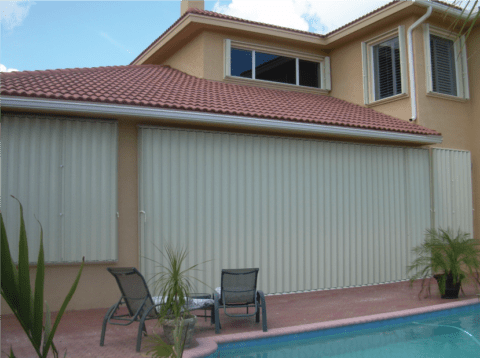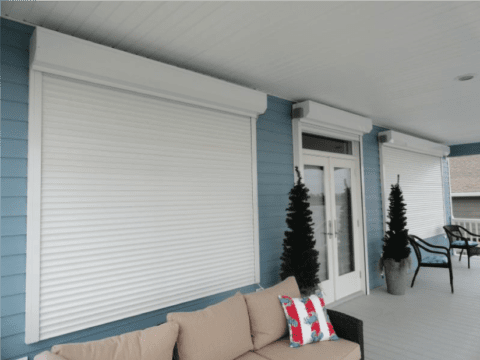How Contractors Can Help Keep Homes Safe
Over the last few years, devastating storms have impacted the United States:
- Hurricane Michael impacted Panama City as a Category 5 storm in 2018.
- In 2019, Hurricane Dorian impacted Grand Bahama as a Category 5, 150-mph storm for 36 hours.
- August 2020 brought Hurricane Laura, a Category 4 storm, into southwest Louisiana. This is one of 30 named storms recorded during the 2020 season.

- In 2021, Hurricane Ida, a Category 4 storm, hit southeastern Louisiana. This storm was one of the costliest in United States history.
- Hurricane Ian, a high-end Category 4 storm with wind speeds up to 155 mph, impacted Florida in September 2022.
- 2024 is now predicted to be one of the worst Hurricane Seasons in recent history with a number of storms riveling the 2004-2005 Hurricane Seasons.
With the increasing occurrence of strong, damaging storms, it is more important than ever to help homeowners be proactive with storm protection.
Tom Johnston, business development manager for Town & Country Industries, a division of ABC Supply, shares some of the most important things contractors should know about hurricane protection.
Impact or “Hurricane” Windows Alone Are Not Enough
Impact windows are becoming more and more popular, and it’s not surprising, considering their impact resistance provides additional protection against both storm damage and the threat of break-ins. However, impact windows are not invincible. In coastal areas, sand blasts and flying debris can damage the glass, leaving homeowners with scratched and foggy windows or, even worse, shattered windows. Hurricane Ian also exposed another risk: Tremendous winds can cause seals to break on insulated units.
In heavy rains, impact windows can leak as they are generally no more water-resistant than standard windows, which are designed to stop water at only 15 percent of a window’s structural design strength rating. For an extra barrier that will protect windows — and your home — from water and wind damage, hurricane shutters could be the answer.
Hurricane Shutters Protect Window Openings — and Roofs

While hurricane shutters do protect against rain and debris beating on a home’s windows, what they are ultimately preventing is wind damage. Their goal of hurricane protection is to protect the structural integrity of a home. Roofs are built to withstand the pressures exerted on them from the outside, but when wind gusts in through a broken window or door, the roof cannot handle the additional pressure pushing up. This can result in the roof blowing off a home, leading to significant structural and property damage.
Hurricane Shutter Sales Are Often Driven by Last-Minute Fear Instead of Preparation
According to Johnston, homeowners are often not thinking about storm protection until a storm affects them. Once the threat of a hurricane is imminent, homeowners may feel rushed to decide how to protect their homes. Contractors can help guide customers to consider incorporating hurricane protection into their building and remodeling plans.
Not only will having storm protection give homeowners peace of mind, but it can also provide financial benefits in the form of insurance discounts. Discounts vary by insurance provider. One such program is the FORTIFIED for Safer Living program, which provides significant benefits to homeowners and businesses in Alabama, Mississippi, North Carolina and Georgia. Insurance discounts can even cover the cost of installing impact windows and hurricane shutters over a short time frame. As value-added advice, contractors can suggest that customers look into the potential benefits that their homeowner’s insurance may offer for storm protection. It is always advisable to consult with your insurance carrier for potential discounts for fortifying your home.
Many Options for Storm Protection Exist

There are more options for hurricane protection than just the traditional hurricane shutters. Johnston has seen two different types of products gaining in popularity: hurricane fabrics and rolling shutters. A new website, HurricaneShield.com, is available for DIY homeowners looking for new high-tech hurricane fabric shutters.
Hurricane fabrics are high-strength, coated fabrics that are attached over windows and doors to provide protection. Some homeowners prefer the fabric option because it can be easily stored when not in use and is less of a hassle to handle than traditional shutters. Rolling shutters — shutters that roll up and down into a box — have been around for years, but the recent addition of a wind lock on many models has increased their popularity. The lock helps the shutter withstand tremendous pressure and stays in place in high winds.
Unsure Where to Turn for Help With Hurricane Protection?
Town & Country Industries is a great place to start. Not only does it have a responsive team, but it also has extensive knowledge of the hurricane protection industry. It even offers training manuals to help contractors learn how to install products.
Additionally, Town & Country designs its products with longevity in mind. Homeowners can add storm protection to their homes and rest assured that even if they don’t experience a hurricane for 10 years, their home will still be protected.
To learn more about Town & Country’s offerings, visit its website. Looking for more information on storm protection? Get in touch with your local ABC Supply or Town & Country location or visit our blog for storm-related content and tips.